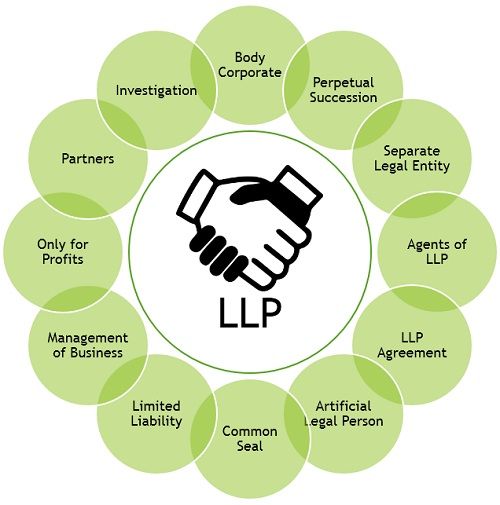A limited liability partnership is a combination of both a partnership and a corporation. It features both of these forms. In The name implies that the partners have limited liability in the company, which means that the partners’ personal assets are not used to pay off the company’s debts. LLP agreement is important Nowadays it has become a very popular form of business as many entrepreneurs are choosing this. The firm has a number of partners and therefore they are not responsible or liable for unfair behavior. Everyone is responsible for their own actions. All limited liability partnerships are governed under the Limited Liability Partnership Act 200. However, LLP was launched in India in April 2009.

LLP Agreement
An LLP agreement is a written agreement between an LLP’s partners or an LLP and its designated partners. It establishes the rights and duties of designated partners towards each other as well as towards the LLP. This is mandatory to execute and file an LLP agreement with the MCA within 30 days of the LLP joining.
LLP lays the foundation for easy management of limited liability partnerships. It defines perspectives and well-defined concepts for decision making, adding a new partner and leaving existing partners or changing roles.

Content of the LLP Agreement
A well-organized and concise summary agreement is essential for the successful operation of an LLP.
Each standard agreement includes the following provisions:
1. Name of LLP
The name should end with LLP or limited liability partnership as per the provision of LLP Act, 2008.
2. The date of the contract and the parties to the contract
The agreement is to be executed within 30 days as per LLP Act, 2008 after joining. The LLP agreement is between all partners and the designated partner. The contract must contain the date and time of entry into the contract.
3. Preliminary provisions
It includes all definitions of the terms used in the LLP Agreement.
4. Location of business
The contract must include the location of the business which is the registered office fee of the LLP.
5. Business activity
It is important to get involved in the business activities of LLP. At the time of incorporation of that LLP, M.C.A. should be of the same nature as approved by.
6. Duration
If the LLP registration in Coimbatore is formed for a certain period, then such a period must be specified after which the LLP must be dissolved. After the completion of such an object budget, an LLP can also be created for a specific object budget; The LLP must be closed. In the absence of a specific period or object budget, one may include the duration of the LLP until it expires with the consent of the partners of the LLP.
7. Accounting and dating etc.
This includes how to maintain the books of accounts, whether it is cash base or accrued basis. During this period the partner can access the books of accounts, whether the audit is mandatory or comply with the rules specified in the LLP Act.
8. Contribution of partners and method of contribution
Represents the capital investment of the investors, the interest on the contribution, the ratio of the distribution of profits as well as the contribution ratio of the partners in terms of that period which can be withdrawn by any subsequent designated partners. It is important to maintain a good relationship between the partners.
9. Record keeping and bank management
This includes the maintenance, collection and recording of books and other related documents.
10. Allocation and distribution
It specifies the system of profit sharing in all partners and distribution, including interim distribution or final distribution. It depicts the distribution of profits between partners according to a fixed ratio.
11. Separation of spouse
Specifies terms and conditions when partners may withdraw or withdraw from an LLP. This is an important clause of the LLP agreement. It states the right to partnership and the rights to property after the extraordinary.
12. Rights to partners’ records
Each partner has the right to inspect the records to avoid irregularities.
13. Management and trustworthy duty
It takes into account the responsibility of managing the LLP and the appointment of the person responsible for taking care of the LLP’s intelligence.
14. Arbitration and General Provisions
In case of conflict between the parties, the parties may include a third party called an arbitrator who listens to both parties and makes a decision, which is accepted by both parties concerned and the final order should apply to both parties.
15. Other provisions
Many other provisions also come under the LLP agreement such as the entry of new partners and subsequent changes in its rights and designations. These include the right to participate in business, interest in title and property, right of access, right to continue independent business, right to recover arrears. And sales, transferring the partnership to an existing partner and another partner. LLP covers the meeting status of the partners, the decision making process, the agenda and the voting rights of the partners.
It also includes the rights of designated partners as well as how to obtain those rights from the LLP. This takes into account the methods of redemption of partners as well as cross purchases. This clause represents the right of the partner to waive.
The following are the main types of LLP agreements.
Equal Rights LLP (1: 1)
In this type of LLP, all partners contribute the same capital, time and effort to the LLP. All receive equal returns and share the same profit and loss. Decisions are made mutually. All partners have equal rights, responsibilities and contribute equally to management as well as business.

Differential Rights LLP
In this type of LLP, the contribution of the partners is different in terms of capital, energy and time as well as responsibility. So the right to share in profits, the right to make decisions and the right to manage are different. It can be classified as an Agreement in which the right is in proportion to the contribution and profit sharing ratio. The level of contribution can only determine the level of profit sharing. Agreements in which the rights are only in the ratio of contributions, but the right to profit is different. Management rights may be equal or in some other ratio.
Therefore, a well-structured detailed LLP agreement sets the basis and acts as the backbone to strengthen pay. It is the guide that gives directions to LLP registration.
